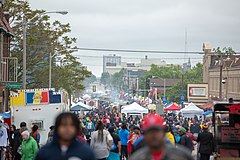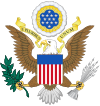| Juneteenth | |
|---|---|
 Juneteenth festival in Milwaukee, 2019 | |
| Official name | Juneteenth National Independence Day |
| Also called | |
| Observed by | United States & parts of Northern Mexico |
| Type | Federal |
| Significance | Emancipation of enslaved people in the United States |
| Celebrations | Festivals, parties, parades, church services |
| Observances | African-American history, culture, and progress |
| Date | June 19[a] |
| Frequency | Annually |
| First time |
|
| Started by | Early celebrations were held by Christian churches and the Freedmen's Bureau |
| Related to | |
| This article is part of a series on the |
| History of the United States |
|---|
 |
| Part of a series on |
| African Americans |
|---|
Juneteenth, officially Juneteenth National Independence Day, is a federal holiday in the United States. It is celebrated annually on June 19 to commemorate the ending of slavery in the United States. The holiday's name is a portmanteau of the words "June" and "nineteenth", as it was on June 19, 1865, when Major General Gordon Granger ordered the final enforcement of the Emancipation Proclamation in Texas at the end of the American Civil War.[8][9] In the Civil War period, slavery came to an end in various areas of the United States at different times. Many enslaved Southerners escaped, demanded wages, stopped work, or took up arms against the Confederacy of slave states. In January 1865, Congress finally proposed the Thirteenth Amendment to the United States Constitution for national abolition of slavery. By June 1865, almost all enslaved were freed by the victorious Union Army, or abolition laws in some of the remaining U.S. states. When the national abolition amendment was ratified in December, the remaining enslaved in Delaware and in Kentucky were freed.
Early celebrations date back to 1866, at first involving church-centered community gatherings in Texas. They spread across the South among newly freed African American slaves and their descendants and became more commercialized in the 1920s and 1930s, often centering on a food festival. Participants in the Great Migration brought these celebrations to the rest of the country. During the Civil Rights Movement of the 1960s, these celebrations were eclipsed by the nonviolent determination to achieve civil rights, but grew in popularity again in the 1970s with a focus on African-American freedom and African-American arts. Beginning with Texas by proclamation in 1938, and by legislation in 1979, every U.S. state and the District of Columbia has formally recognized the holiday in some way.
Juneteenth is also celebrated by the Mascogos, descendants of Black Seminoles who escaped from slavery in 1852 and settled in Coahuila, Mexico.[10]
The day was recognized as a federal holiday in 2021, when the 117th US Congress enacted and President Joe Biden signed the Juneteenth National Independence Day Act into law. Juneteenth became the first new federal holiday since Martin Luther King Jr. Day was adopted in 1983.[11]
- ^ "Cel-Liberation Style! Fourth Annual Juneteenth Day Kicks off June 19". Milwaukee Star. June 12, 1975. Archived from the original on June 20, 2020. Retrieved May 7, 2020.
- ^ Silva, Daniella (June 16, 2020). "What to know about Juneteenth, the emancipation holiday". NBC News. Archived from the original on June 19, 2020. Retrieved June 19, 2020.
- ^ Davis, Kenneth C. (June 15, 2011). "Juneteenth: Our Other Independence Day". Smithsonian. Archived from the original on June 17, 2020. Retrieved June 27, 2019.
- ^ Cite error: The named reference
crswas invoked but never defined (see the help page). - ^ "Juneteenth Celebrated in Coachella". Black Voice News. June 22, 2011. Archived from the original on January 22, 2012.
- ^ Gulevich, Tanya (2003). Encyclopedia of Christmas and New Year's Celebrations. Omnigraphics. pp. 188–211. ISBN 9780780806252.
- ^ "Federal Holidays". U.S. Office of Personnel Management. Archived from the original on November 10, 2021. Retrieved November 12, 2021.
- ^ Cite error: The named reference
:1was invoked but never defined (see the help page). - ^ Gates, Henry Louis Jr. (January 16, 2013). "What Is Juneteenth?". PBS. Archived from the original on June 11, 2020. Retrieved June 12, 2020.
- ^ "Mascogos. Pueblo de afrodescendientes en el norte de México" [Mascogos. People of Afro-descendants in the north of Mexico.]. gob.mx (in Spanish). Archived from the original on July 31, 2017. Retrieved July 31, 2017.
- ^ "President Biden Signs the Juneteenth National Independence Day Act Into Law". YouTube. June 17, 2021. Archived from the original on December 11, 2021.
Cite error: There are <ref group=lower-alpha> tags or {{efn}} templates on this page, but the references will not show without a {{reflist|group=lower-alpha}} template or {{notelist}} template (see the help page).